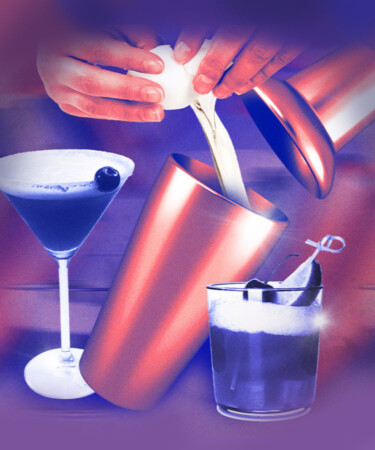If you can’t say no to a good Whiskey Sour, the odds are high that you’ve enjoyed an egg white cocktail or two in your life. In properly made sours and other sips, egg whites add a nice foam head, which allows for creative garnishing like artfully placed aromatic bitters or dried herbs and flowers. Otherwise, egg whites function by providing a creamier mouthfeel and softening harsher flavor profiles from the citrus juice and booze commonly found in sour riffs.
But due to fears of contracting salmonella poisoning or of the resulting cocktail tasting like egg itself, some home bartenders find egg whites an intimidating ingredient, causing many to stray away from the ingredient altogether. So, to learn how to properly and safely prepare egg white cocktails at home, VinePair tapped Justin Lavenue, bartender, owner, and operator of Austin’s The Roosevelt Room and The Eleanor, for his tips and tricks.
Lavenue explains that, first and foremost, it’s imperative to ensure your eggs are of high quality, with farmers market produce being your best option. “You also need to make sure when purchasing that your eggs don’t have any cracks or other imperfections as this can allow for bacteria to enter the egg,” he says. Though eggs are closed systems — meaning when left alone, they are able to stay shelf-stable for long periods of time — the moment a shell is cracked or otherwise broken, it becomes vulnerable to unwanted bacteria and mold that, if eaten, can make you very sick. However, as long as your eggs are intact, they are safe to use in cocktails and your chances of acquiring salmonella are essentially zero.
“Even if you’re eating the egg white raw, if it is pasteurized and comes from a closed system egg, it’s safe to consume,” Lavenue says. “However, you’re not eating it raw. You’re further stabilizing the ingredient with alcohol, which lowers your chances of salmonella even more because you’re essentially killing any and all harmful bacteria with the ethanol from the alcohol.”
When adding the egg whites to your shaker, it’s important to wash up beforehand to prevent any bacteria from your hands interacting with the eggs. From there, Lavenue suggests tossing the yolk between the two halves of the cracked egg shell, allowing the egg whites to slowly seep into the mixing tin.
“There are many different ways to add egg whites, but I’ve always found this way to be the easiest,” Lavenue says. “The main thing is to make sure you get a clean cut on the egg. Rather than cracking it on a countertop, which I’ve seen some bartenders do, I always like to crack the egg against my cocktail shaker. It splits the shell really nicely into two halves and also lowers the chances of the egg white and egg yolk combining and thus ending up with yolk in your cocktail.”
Those who continue to struggle with the idea of drinking egg whites aren’t alone, but as Lavenue points out, there’s never been a better time to try your hand at a homemade sour. “In general, when people are timid about using eggs, I like to counteract this by explaining that they have actually been used in cocktails for centuries,” he says. “Interestingly enough, the use of egg whites in alcoholic drinks actually predates the word cocktail itself.”
